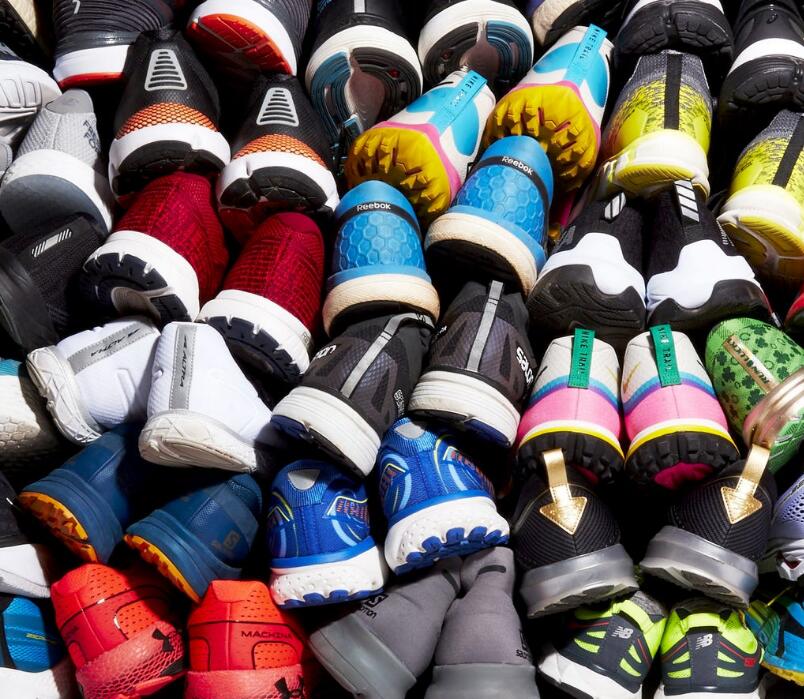
The Best Running Shoes of 2022
You know what you want from your running shoes: light weight, cushioning, support, and a comfortable fit. Of course, the most important part of any running shoe is your experience over the hundreds of miles you’ll take it on. To help you find your next great pair, and to get a sense of how updates to your favorite road or trail shoe may change how it fits or performs, we review hundreds of men’s and women’s running shoes each year. Scroll down for reviews of our 33 top picks, a look at how we test and select these models, and helpful buying tips and insight from our gear experts.
Best Running Shoes
Best All-Around Running Shoe: Brooks Ghost 14
Best Women’s Specific Shoe: Lululemon Blissfeel
Best Cushioned Trainer:Hoka Mach 4
Best Stability Shoe: Asics Gel-Kayano 28
Best Cushioned Zero-Drop: Altra Paradigm 6
Best for Racing: Asics MetaSpeed Sky
Fastest Running Shoe: Nike ZoomX Vaporfly Next% 2
Best Lightweight Training Shoe: Hoka Rincon 3
Most Cushioned Trial Shoe: Brooks Caldera 5
Best for Trails and Roads: Salomon Ultra Glide
How We Test Shoes
Runner’s World has the most comprehensive running shoe testing process in the industry. We work with more than 250 local runners of all abilities, ages, and sizes for real-world wear-testing on paved roads, dirt paths, and rocky singletrack. After a month of running more than 100 miles in their respective running shoes, our testers report back their findings on features like fit, Nobull Shoes comfort, performance, and ride. While they’re putting miles on the shoes, the same models undergo a battery of mechanical tests in our RW Shoe Lab, where we objectively measure each shoe’s cushioning, flexibility, sole thickness, and weight. Our test editors combine their own experience in the shoes with data from the lab and feedback from our wear testers to create reliable, useful reviews of every pair we run in.
How to Choose the Best Running Shoe
Some runners care a lot about weight, and research shows that you expend more aerobic energy with heavier shoes. Lighter shoes typically have less cushioning, which can make them feel faster, but new midsole foams now make a plush ride possible without adding much heft to the shoe. If you’re going long distances, some extra cushioning might be a better option, as it provides impact absorption.
To test softness, we go to our Shoe Lab to take individual measurements of both the heel and forefoot, since the overall experience can vary based on where a runner touches down and toes off. The cushioning scores are given on a scale of 1 to 100, with one being the firmest. (A harder-feeling shoe won’t necessarily lack cushioning, and according to some biomechanical research, a midsole that’s too soft can actually increase peak impact forces.) In addition to those key stats, we also look at the running shoe’s stability features, flexibility, and energy return to help you find one you’ll love.
Also, be sure to consider a running shoe’s drop—sometimes referred to as offset—which is the difference between the heel and the forefoot measurements, or how much your toes “drop” below your heel. It’s important because a higher drop can lead to more heel striking and also transfers some strain away from the lower leg and up toward the knee. Conversely, a lower offset will shift that load farther down the chain of motion during your gait cycle to the calf and the Achilles. Neither option is necessarily better than the other; when deciding on a shoe’s drop, choose what feels most natural and comfortable to you, taking into account your personal running mechanics and injury history. Many shoes have a drop between 8 and 12mm, but some shoes have less than 6mm. A few based on minimalist designs have no drop.
Ghost. Pegasus. Kayano. Rider. These titans have been some of the best-selling running shoes for decades and are commonly referred to by just one name. When asked for a shoe recommendation by new runners, or for those who aren’t sure what they need, we generally point to classics like these as a starting point. After all, there’s a reason the Nike Air Zoom Pegasus has been around for 38 years: It works for most people, most of the time.
Weight: 8.9 oz. (M), 7.9 oz. (W)
Drop: 12 mm
Type: Road
From the dyeing process to the tongue’s recycled-mesh material, the Ghost has undergone a climate-conscious makeover. Brooks is also transitioning to sustainable manufacturing and shipping, and recycling used shoes instead of dumping them in landfills. Schutz Shoes ,But when tinkering with your best-selling model, you don’t want to mess it up. Rest easy, Ghost fans: Neither quality nor performance was compromised in this update. Brooks removed the BioMoGo DNA portion of the midsole, so the Ghost 14 has only DNA Loft foam, just like its plusher counterpart, the Glycerin. Our testers found this adjustment doesn’t change the Ghost’s ride noticeably. “It had a nice balance of cushioning and firmness during turnover,” said a tester, adding that the Ghost felt more responsive than the Glycerin and Adrenaline GTS.—Amanda Furrer
Weight: 10.0 oz (M), 8.2 oz (W)
Drop: 10 mm
Type: Road
Last year, the Pegasus’s midsole switched from older Cushlon foam to more-responsive React, and Nike added two more millimeters of it underfoot. Still not as light and bouncy as ZoomX, React feels medium soft, and moderately flexible. Nike also lowered the pressure in the air unit in the women’s running shoe (15 PSI, compared to 20 PSI for men) to make it a touch softer, doubled the size of the forefoot unit for extra pop on toe off, and scrapped the air unit from the midfoot and heel. The outsole got a facelift, too, with more flex grooves and a rectangular tread pattern that slightly improves grip for short stints offroad.—Morgan Petruny
BUY MEN’S BUY WOMEN’S FULL REVIEW
Weight: 10.9 oz (M), 9.1 oz (W)
Drop: 10 mm
Type: Road
The Kayano has been a part of the Asics Shoes lineup for decades, and it remains one of the company’s most popular shoes. Designed to deliver support for overpronators, many neutral runners reach for it because of its legendary comfort. The Kayano 28 is upgraded with FlyteFoam Blast cushioning for a smooth, responsive ride and a new low-profile heel clip for added support. Gel pods remain under the heel and forefoot, giving you extra shock absorption, and the dual-density midsole and medial plate work together to counter overpronation in your stride.
BUY MEN’S BUY WOMEN’S
Weight: 9.7 oz (M), 8.1 oz (W)
Drop: 12 mm
Type: Road
Twenty-five marks a huge milestone for the Rider. As a wearer of the Rider since its 13th version, I found it’s definitely the softest and most cushioned Rider I’ve ever worn. That in part is because the brand delivered on the promise it teased us with in the Rider 24: a full-length midsole layer of luxuriously soft Enerzy foam. In previous Riders, the midsole featured a mix of foams—ranging from its firmer U4ic to TPU-bead based XPOP—both above and below the wave plate. Though comfortable underfoot, the combination of different foams made the shoe’s ride feel a bit disjointed. With only Enerzy foam throughout, the ride is smoother and more consistent—especially when paired with the 25’s new castor bean–based Wave plate. Built at a higher amplitude (the Rider 24’s plate was flatter), it helps return more energy with each footstrike, and more closely matches the shape of the arch. It’s smooth and springy, the perfect ride for long runs when you’ll be spending a lot of time on your feet.—M.P.
BUY MEN’S BUY WOMEN’S FULL REVIEW
Weight: 10.2 oz (M), 9.1 oz (W)
Drop: 8 mm
Type: Road
Although it’s technically a heavy shoe, on par with other luxe trainers like the Brooks Glycerin 19 and Altra Paradigm 6, the Triumph 19 rides light and bouncy. Giving it that energetic sensation is a Pwrrun+ midsole and top sole, introduced in the 17. Pwrrun+ foam is 28 percent lighter than the brand’s original Pwrrun; it’s supportive for easy long runs, and responsive on tempo runs and workouts. To deliver a comfortable yet stable ride, Saucony increased the angle of the beveled heel and toe spring in the Triumph 18, promoting a smooth heel-to-toe roll. This geometry is preserved in the 19. This update does get a new mono-mesh upper, which is lighter and more breathable—it was a favorite feature among our testers. “There was plenty of room in the toe box,” said one. “It’s easy to lace up and tighten around the midfoot, and my heel felt supported without being too snug.” That’s the real draw with the Triumph: its all-encompassing comfort. Every facet of the 19 is soft. The collar and tongue are pillow-like, securing your foot after knotting the bucatini-thick laces, your toes granted ample wiggle room.—A.F.
BUY MEN’S BUY WOMEN’S FULL REVIEW
Weight: 8.2 oz. (M), 6.8 oz. (W)
Drop: 5 mm
Type: Road
After testing the Mach 4, deputy editor Dengate said that it is “the best Mach yet, and perhaps the best Hoka currently.” It’s so good that he ran in nothing but the Mach for six weeks straight. Our other testers agreed. One declared that it was her new favorite cushioned road shoe. And another, a first-time Hoka wearer, said the shoe impressed her after a single run. We already loved the light weight and explosive rebound of the first three Machs. But Hoka went next level, adding design features borrowed from the Carbon X and Rocket X. In this way, the Mach 4 is like Saucony’s Endorphin Speed or the Brooks Hyperion Tempo—a dynamic training shoe that’s more versatile than the pure racers in each brand’s line. Don’t be shocked if you’re compelled to zoom while running in the Mach 4. It owes this giddyup to the responsive Profly foam and early-stage Meta-Rocker (a slightly curved sole shape) that feels like it catapults you forward. This shoe is generously cushioned without turning your run into a slog, so you can rock it for everything from easy jogs and recovery runs to an interval session on the track. The upper is woven with heat-pressed TPU embroidered yarns, and hugs your foot more securely than the Mach 3. A sportier looking heel collar provides padding without any friction on the Achilles.—A.F.
BUY MEN’S BUY WOMEN’S FULL REVIEW
Weight: 9.1 oz. (M), 7.4 oz. (W)
Drop: 8 mm
Type: Road
Last year’s 1080 earned NB an Editors’ Choice award, and this update was a hit with our test crew too. That’s because it’s almost identical to last year’s model. Perhaps the biggest change is v11’s knit upper, which has a stretchier forefoot that makes the shoe fit better for runners with wide feet. That change also makes the shoe a little more breathable. But a few wear-testers noted that the upper creates extra pressure through the midfoot, making the shoe a little uncomfortable on long runs. The sole remains unchanged, except for a slight cosmetic tweak to the dot pattern on the sidewall. You still get the thick slab of Fresh Foam X, which boasts higher energy return and comfort than the classic Fresh Foam. On the run, it doesn’t feel overly soft or slow, which we like because that boosts the shoe’s versatility. Those small tweaks might make the new version a better option for some runners; if not, you can probably find last year’s equally good running shoe at a deep discount.—Jeff Dengate
BUY MEN’S BUY WOMEN’S
Weight: 8.9 oz (women’s 7)
Drop: 9.5 mm
Type: Road
Lululemon is approaching runners with renewed vigor, releasing its first running shoe, the Blissfeel—and it’s legit. We tested it for five months before the launch and our wear-test team came away highly impressed by this debut shoe. I found the shoe hugs my foot, is flexible, and has a slight snap, which made me feel swift as I accelerated on my usual six-mile route. I was sold, telling anybody who would listen that they should give the Blissfeel a college try. The shoe isn’t flashy—our test samples were black and white, which made it easier to keep them secret for so many months of testing—nor is it equipped with high-tech materials that would appeal to speed racers. It’s a moderately cushioned every day running shoe, one that I find myself grabbing for both easy runs and some workouts.—A.F.
BUY WOMEN’S READ THE FULL REVIEW
Weight: 7.4 oz (M), 6.2 oz (W)
Drop: 5 mm
Type: Road
When the Rincon made its debut, runners raved about its low weight and versatility. “Literally can’t say a bad thing about this shoe,” gushed a tester. On its third iteration, the Rincon continues to impress. The 3 is even lighter while still maintaining that thick midsole Hoka is known for. Its cushioning strikes a balance between comfortably soft and supportively firm. It’s the speed-training counterpart to Hoka’s daily workhorse, the Clifton (the Rincon is almost 2 ounces lighter than the Clifton), making it ideal for tempo runs and track sessions. “It has a great ground contact that doesn’t feel too soft or mushy compared to my other highly cushioned shoes,” said a tester. “I ended my long runs faster than I started them, thanks to the shoe’s light weight.” Testers appreciated the redesigned mesh upper, which is more breathable—we tested them during a string of 90-degree days in the Northeast—and appreciated that the shoes don’t cause blisters or pinch your feet.—A.F.
BUY MEN’S BUY WOMEN’S FULL REVIEW
Weight: 9.7 oz (M), 7.8 oz (W)
Drop: 8 mm
Type: Road
When’s the last time you used the word “fun” to describe a pair of running shoes? Then try the Novablast, a rogue running shoe so different from Asics’s traditional offerings that some runners hardly recognized it as an Asics. The first version had midsole that protruded at angles that looked like the surface of the Epcot ball. FlyteFoam Blast made for a wickedly bouncy run, but it was about as stable as a vat of radioactive plutonium. For the sequel, Asics reigned in that reckless ride with a more supportive midsole. Designers carved out some foam from the lateral sidewalls, and added more foam to the medial side to help keep the shoe from collapsing inward as you roll through your stride. The midsole foam itself has the same chemistry, so the ride feels just as springy and energetic, but is more controlled underfoot. Take the Novablast out for long runs at a steady clip, when you want to simply zone out and set the cruise control. Why? Because the midsole truly does feel “trampoline-like.” Upon landing, you sink into the foam slightly before rebounding—a sensation that reminded one tester of loping across a birthday party bounce house.—M.P.
BUY MEN’S BUY WOMEN’S FULL REVIEW
Weight: 10.6 oz (M), 9.1 oz (W)
Drop: 5 mm
Type: Road
The Bondi is the shoe generally associated with Hoka: extra thick and extra soft. While that usually means the shoe is comfortable, those characteristics can also make it slow. Surprisingly, not in this X version. Hoka revved up the Bondi by embedding a carbon-fiber plate in the compression-molded EVA midsole, which is similar to the foam used in the Carbon X and Rocket X (shoes for the PR-minded). Like the OG Bondi, it has a rockered sole for a smooth heel-to-toe roll, but the carbon-fiber plate promotes a more aggressive toe-off. And while the sole still looks chunky, every part has a purpose. For example, the slab of heel foam absorbs impact as the “swallowtail” grooves on the sides smooth out the landing and make for an energetic ride. Larger runners who prefer soft cushioning might opt to race in this shoe, but it’s quite a lot of foam to push hard during speed sessions.—A.F.
BUY MEN’S BUY WOMEN’S FULL REVIEW
Weight: 7.5 oz (M), 6.3 oz (W)
Drop: 8 mm
Type: Racing Shoes
The Endorphin Pro 2 has undergone subtle changes, so runners smitten with the OG can exhale a sigh of relief. This second iteration of Saucony’s carbon-fiber-plated racer continues to offer what its competitors fall short on. For example: The thin, cloth-like, single-layered engineered-mesh upper envelopes the foot without any unnecessary pressure. It doesn’t overheat like Nike’s Vaporweave when you’re six miles into a marathon. And it has a more secure ankle fit than Brooks’s unisex Hyperion Elite, which women found to have a loose collar and heel—a common problem for women running in unisex shoes. The 2 provides more support around the heel with an even more secure fit, though runners with weak ankles may still feel wobbly cutting corners. And, the new closure system has elastic bands strategically placed to prevent the tongue going askew.—A.F.
BUY MEN’S BUY WOMEN’S FULL REVIEW
Weight: 6.9 oz (M), 5.8 oz (W)
Drop: 8 mm
Type: Racing Shoes
When you make the world’s fastest shoe, you don’t mess it up. And, good news: Nike didn’t. In fact, the changes to version 2 were limited just to the upper, focused on improving comfort and durability. The sole of the shoe is still where the magic happens, thanks to the exceptionally lightweight, soft, and springy ZoomX foam and rigid carbon-fiber plate that help you bound down the road with less effort. It’s the kind of package that allows elite marathoners to race well under five-minute pace, but we love that it delivers a screaming ride whenever we push it hard, even at shorter distances. If you’re going long, you’ll appreciate the new mesh. The previous Vaporweave upper, a ripstop nylon–like material that didn’t absorb water, has been replaced with an engineered mesh. We found that the Vaporweave just didn’t stretch at all—particularly a problem for those of us with high insteps—and created a lot of pressure late in a race. The new mesh resolves that problem.—J.D.
BUY MEN’S BUY WOMEN’S
Weight: 8.7 oz (M), 7.3 oz (W)
Drop: 8 mm
Type: Racing Shoes
Plates are nothing new for Mizuno, which has been using Wave technology for years. But the brand made a big shift in the material it chose to use in its newest uptempo trainer—fiberglass. This light and firm introduction has a bio-based wave plate made from castor beans and nylon, reinforced with glass fibers. That makes it stronger and snappier than the Pebax plates used in other Wave models, and more than 10 times more responsive according to Mizuno. The increased responsiveness comes from both the new materials and the shape of the plate itself. The plate runs nearly the full length of the shoe, extending all the way to the forefoot, where it splits into two pieces, like a lobster claw. This gives the shoe a peppy feeling at toe-off, especially for those who land closer to their midfoot. When running up- and downhill, we noticed a pronounced quick-rolling flick accompanying each footstrike.—M.P.
BUY MEN’S BUY WOMEN’S FULL REVIEW
Weight: 9.3 oz. (M), 7.5 oz. (W)
Drop: 10 mm
Type: Racing Shoes
Behind the scenes, Puma has worked to re-establish itself as a manufacturer of serious running shoes. The Deviate Nitro is the first indication that the company is on the right track. Like just about every other brand, Puma wanted a shoe with a carbon-fiber plate to earn some cred. This is that shoe. It also has a lightweight, bouncy foam—it’s TPE, not the pricier, springier Pebax that some other brands use and which makes you really want to kick your heels to your butt. The foam is nitrogen-infused, however, giving it a responsive sensation underfoot, and it proved durable in our testing. Puma’s foam choice means the shoe doesn’t feel quite as fast as some of the latest top-end racing shoes, but at just $160, it’s an affordable, versatile running shoe that you can use for training and racing. “These shoes blew me away,” gushed one tester. “I wore them for everything from a 9-minute-per-mile cruise to a 10K PR, and they felt fully capable doing both.” The one knock: Padding on both sides of the heel is a bit high and thick, which could create a little slippage for some runners.—J.D.
BUY MEN’S BUY WOMEN’S FULL REVIEW
Weight: 8.4 oz. (M), 7.0 oz. (W)
Drop: 5 mm
Type: Racing Shoes
When we initially ran in it a year ago, the Carbon X had us going fast over mid- to long-distance runs. But after our wear-testers clocked hundreds of miles, we determined that midfoot-strikers got the most out of the shoe. A heel-to-toe roll propelled by the early-stage Meta-Rocker (Hoka’s construction of a slightly curved sole) felt quite aggressive to some testers, especially heel-strikers. Those runners won’t feel left out with this update, though. A protruding heel, which is similar to Hoka’s TenNine (though not as massive), absorbs shock and provides stability for runners who touch down on the back of their foot. “If I raced a marathon or less, I’d go with the Saucony Endorphin Pro,” said a heel-striking tester. “If I raced a 50K or more, I’d use the Carbon X2.” As a heel-striker and tester of the Endorphin Pro, I agree. As in the Endorphin Pro and Hoka’s other racing shoe, the Rocket X, a carbon-fiber plate in the midsole promotes quick and snappy transitions. The X2 feels hardy for longer mileage, as well as versatile enough for speed training. Our test team liked the refined upper—the reinforced lacing and engineered support zones made it feel
more secure.—A.F.
BUY MEN’S BUY WOMEN’S FULL REVIEW
Weight: 6.7 oz. (M), 5.5 oz. (W)
Drop: 9 mm
Type: Racing Shoes
The Sky is built for that “stride” runner. With a 5mm drop and almost uniformly thick midsole from heel to toe, it helps those runners increase their stride length while making them roughly 3 percent more economical—runners use less energy to cover a given distance. Buried deep in that foam block is a full-length carbon plate. It’s curved to reduce ankle flexion, so you expend less energy from the joint. This is something Asics has tried on shoes like the MetaRide, claiming its “Guidesole” construction reduces energy loss at the ankle by 19 percent. In that shoe, Asics uses an extreme rocker so when you land, your foot rolls directly forward to toe-off, rather than requiring you to stabilize your footstrike. Over a dozen runs in the MetaSpeed Sky, I found it to feel—and even sound—quite a lot like the Vaporfly. There’s plenty of comfort and it’s undeniably faster than most other shoes we’ve tried, thanks to a good mix of cushioning and responsiveness.—J.D.
BUY MEN’S BUY WOMEN’S
Weight: 7.8 oz (M), 6.3 oz (W)
Drop: 8 mm
Type: Racing Shoes
Typically, running shoes only see major updates every other year. But, for v2 of this plated racer, New Balance rebuilt it from the ground up—all for the better. The v1 was an admirable first attempt at getting something in NB’s lineup that could compete with Nike’s Vaporfly. It fell short, mostly because the sole was thinner and just didn’t deliver a similar bouncy, propulsive ride. But v2 is way softer and springier than before, thanks to a much thicker midsole. The heel stack—a measure of everything between your foot and the road—is up to 39mm, 7mm taller than before. And the forefoot got an even bigger boost, reducing the drop from 10 mm to 8mm. That extra thickness not only improves cushioning, it also gives New Balance more space under the hood to beef up the engine: The carbon-fiber plate has been reshaped with more curve, delivering better responsiveness and propulsion. It had our wear-test team running faster than they’d planned, even on easy days. —J.D.
BUY MEN’S BUY WOMEN’S
Weight: 8.5 oz (M), 8.0 oz (W)
Drop: 8 mm
Type: Racing Shoes
The sleek Flow Velociti SE (sports edition) is a long-run shoe disguised as a racing flat. It offers a minimal underfoot experience for runners who prefer a firm ride, even when they venture into double-digit territory. While some runners may want more cushioning, our most efficient testers found it adequate to take the harshness from the pavement. “The foam and rubber combination held up on this shoe, even though it has a lightweight construction,” said one tester. “I tend to heel strike, and this shoe gave me confidence on my longer training runs.” Other heel-strikers found the shoe surprisingly forgiving on hard efforts, though midfoot-striking testers wished the forefoot was more supportive. Because of the midsole’s durability and abrasion resistance, Under Armour could save some weight by eliminating outsole rubber. Instead, thin grooves in the foam provide grip, though testers weren’t as keen on its performance over wet surfaces.—A.F.
BUY MEN’S BUY WOMEN’S
Weight: 10.8 oz (M), 9.3 oz (W)
Drop: 0 mm
Type: Stability Running Shoes
You could reserve Altra’s cushiest trainer for easy runs and recovery days. Or use the Paradigm 6 as an everyday shoe like Altra-sponsored athlete Kara Goucher, who says she wears it for 70 percent of her workouts. The 6 features Altra’s Ego Max midsole, which provides more energy return from the thick slab of firm cushioning. You can partially thank Goucher for the increased rebound. In testing prototypes, Goucher gave insight into stability shoes that typically don’t feel as snappy, asking for a couple of tweaks including “just a little more responsiveness off the bottom of the foot.” With these minor changes and the new Ego Max midsole, this Paradigm isn’t for slogging. “Though I first thought the Paradigm was going to be too bulky, I even used it for speedwork,” said one of our wear-testers. The Paradigm’s high stack (33mm) and guide-rail system lend support, making it an ideal choice for runners who want to try a zero-drop shoe but want some extra comfort.—A.F.
BUY MEN’S BUY WOMEN’S
Weight: 9.7 oz (M), 7.8 oz (W)
Drop: 10 mm
Type: Stability Running Shoes
Cushioned stability shoes are undergoing a small resurgence. Runners who tested last year’s Arahi raved about its versatility for speedwork and 5Ks, too. We experienced more of the same from the Arahi 5. It weighs tenths of an ounce less than its predecessor, and it feels even lighter when on foot. And it’s comfy, too; a padded tongue and heel collar lock in your ankle without causing much friction. The new pull-tab, which looks like the spoiler on a sports car, allows you to slide into the trainer without crushing the heel counter. As a stability shoe, the Arahi lends overpronators support with a dense EVA J-Frame, so called because it wraps around the heel and medial side of the shoe in a J-shape. I used to save trainers like the Arahi and Brooks’s Glycerin GTS for easy jogs and recovery runs. But, gliding down my usual route, I changed my mind about the Arahi, thanks to the snug fit that’s really been dialed on this version, and the secure, planted ride that feels faster than a traditional stability shoe. It looks fast, too, which impressed several other wear-testers. “Cosmetically, it blew away my perception of Hokas,” one tester said.—A.F.
BUY MEN’S BUY WOMEN’S FULL REVIEW
Weight: 8.8 oz. (M), 8.1 oz. (W)
Drop: 10 mm
Type: Stability Running Shoes
You’re not wrong if you thought “GTS” stood for “Go-To Shoe.” This year, Brooks is simplifying its naming convention by pairing stability shoes to its neutral siblings and tacking on GTS—now redefined as “Go-To Support.” The next Transcend and Bedlam, for example, have been named the Glycerin GTS and Levitate GTS. And, in the case of the Ravenna, it’s now being called the Launch GTS—a light stability shoe that’s speedy like the neutral Launch. Testers appreciated the comfortably firm cushioning and found Brooks’s holistic guide-rail system (firm foam along the medial and lateral sides of the heel serve as bumpers to align the knee and ankle) supportive. The most noticeable revamp—besides the name—is the new air mesh upper. Testers liked that it was light and breathable, yet some wished for a more traditional padded heel collar instead of the oddly shaped one here. “It felt to me that the heel collar was too high on my ankle,” said a tester, “and it rubbed my lateral ankle bone, causing discomfort.”—A.F.
BUY MEN’S BUY WOMEN’S
Weight: 10.5 oz. (M), 9.4 oz. (W)
Drop: 8 mm
Type: Stability Running Shoes
Saucony’s versatile stability shoe now looks race-ready with 3D-print overlays adorning the engineered-mesh uppers and sharing the same color scheme of the racier Kinvara. The Guide has plush padding in the heel collar and gusseted tongue. This stability version of Saucony’s Ride has a lightweight TPU medial post and sturdy heel counter to lend support, which testers found comfortably supportive. One tester even had a revelatory moment wearing the shoe. “I often lean toward more cushioned shoes with the assumption that, being a ‘curvier’ runner, the weight striking the hard surface was the cause of some injuries,” she said. “The Guide gave me some cushioning, but the shoe’s stability helped fix my pain.” This shoe is still soft, though, thanks to Saucony’s Pwrrun midsole, combined with a top layer of Pwrrun+. The latter is composed of a lightweight foam that promotes a springier step while absorbing impact.—A.F.
BUY MEN’S BUY WOMEN’S FULL REVIEW
Hoka Zinal
Weight: 8.5 oz. (M), 6.9 oz. (W)
Drop: 5 mm
Type: Trail Running Shoes
Trail shoes are usually decked out with all the beefy features needed to take on any scourge that blocks your way: a rock plate to shield your soles from getting jabbed, aggressive lugs to bite into loose ground, and gaiter attachments to keep the elements out where they belong. By eliminating these features that tend to weigh down a shoe, Hoka launched this lightweight, no-fuss trainer meant for speed and agility. Its 4mm lugs are grippy on uneven surfaces but unobtrusive over stretches of pavement you may hit on the way to a trailhead or when linking up sections of trail. Dare we call this shoe a hybrid? The shoe isn’t totally free of trail-specific features. The upper has a toe bumper as well as a gusseted tongue, which is designed to block out debris on loose ground. It’s not as secure as a full gaiter—I had to tolerate a few stowaway pebbles and empty them out postrun.—A.F.
BUY MEN’S BUY WOMEN’S FULL REVIEW
Weight: 11.2 oz. (M), 9.2 oz. (W)
Drop: 4 mm
Type: Trail Running Shoes
One might guess that “ST” stands for “Stability” or “Speed Trainer,” but Saucony actually uses it here to designate that this version of its popular trail shoe is tuned for “Soft Terrain”—though its ride would make those other guesses accurate, too. A wide platform and low drop give the Peregrine its stable feel, and an upgrade to premium Pwrrun+ cushioning this year offers more go-fast energy return. But you’ll also find that on the standard running shoe. What sets the ST apart is its muck-loving outsole and upper, which are built for a full send along swampy singletrack. The toothy lugs are 1.5mm longer, with more spacing between each to shed mud quickly, and the upper is switched to an abrasion-resistant mesh outfitted with quick lacing. To secure the shoe, just cinch the skinny bungee cords and stow them inside the tongue—there’s no fiddling with wet bunny ears. Plus, the entire shoe is cloaked in its own mud guard. If that’s still not enough splatter protection, you’ll find additional loops to add your own gaiters. “The Peregrine was exceptional across the board,” said one tester, “wonderfully responsive and capable across deep mud and loose gravel to snow, with an amazing fit that needed none of my usual lacing tricks.”—M.P.
BUY MEN’S BUY WOMEN’S FULL REVIEW
Weight: 8.0 oz (M), 6.3 oz (W)
Drop: 4 mm
Type: Trail Running Shoes
Longtime readers of RW shoe reviews know that we love the Skechers GOrun Razor 3. That road shoe is light, fast, and fun. And it’s remained completely unchanged for almost three years now because it’s just that darn good. But, Skechers has expanded upon the model, releasing a carbon-plated version for road races as well as this off-road running shoe, with a grippy, go-fast sole. The midsole is exactly the same as the road shoe, built using the brand’s Hyper Burst foam. It starts out as a solid block of EVA plastic that is exposed to a supercritical fluid—basically, CO2 gas is heated under pressure until it returns to a liquid state. There’s a lot of science behind how it happens, but it creates a cell composition which makes the shoe lighter, yet still responsive and well-cushioned. It also makes the foam surprisingly protective when you’re dancing over rocks and roots. Because this is a lightweight trail shoe, it doesn’t have a rock plate, so you’re likely to want a beefier model if you bash over gnarly ground.—J.D.
BUY MEN’S BUY WOMEN’S
Weight: 9.6 oz. (M), 8.6 oz. (W)
Drop: 0 mm
Type: Trail Running Shoes
The Superior is the closest you can get to running barefoot while still reaping the benefits of a traditional trail-running shoe—gaiter attachments, resilient mesh, a grippy tread. One standout feature of the Superior is the removable stone guard, a pliable yet protective full-length insert you tuck under the insole. This “take it or leave it” component caters to trail runners who want the extra buffer underfoot as well as those partial to the ground-feel that a thin, flexible midsole delivers. Yank it and you save nearly an ounce of weight, too.—A.F.
BUY MEN’S BUY WOMEN’S
Weight: 11.6 oz. (M), 9.5 oz. (W)
Drop: 8 mm
Type: Trail Running Shoes
Mountain runners idolize the grip and agility of mountain goats as they bound up and down steep and rocky terrain with ease. La Sportiva’s trail running shoes have earned a similar cult-like reputation, thanks to their ability to tackle the roughest, steepest terrain with precision. Fans of the long-lasting Mutant will find their favorite shoe taking a new life in the Cyklon, which might just be the closest you can get to goatlike performance on your own feet. While it’s mostly designed for short to mid-distance technical races like a Vertical K or sky race, the Cyklon also offers a snappy and sticky trainer for any day you might find yourself scrambling across scree and boulders. The combination of the lug pattern and the outsole rubber compound gives you confident footing on all surfaces, no matter how wet or dry. The low, firm midsole also gives plenty of ground feel and stability, crucial for technical or loose terrain. The upper takes the glove-like fit of the Mutant to the next level. La Sportiva shoes typically fit tightly, to the point where we’ve had to go up a couple of sizes on some models to get enough width. The Cyklon is still narrow compared with most shoes, but the fit is more accommodating and closer to a normal running shoe size.—Pat Heine-Holmberg
BUY MEN’S BUY WOMEN’S FULL REVIEW
Weight: 10.2 oz. (M), 8.3 oz. (W)
Drop: 8 mm
Type: Trail Running Shoes
The previous version of the Sense Ride was incredibly comfortable, reliable, and durable for everyday trail running and racing, and you can see from the silhouette of this update that Salomon didn’t mess with it. Updates on the 4 largely center around fit and comfort in the upper, as well as reducing some weight. Our favorite feature remains the shoe’s traction—4mm diamond-shaped lugs bite into soft dirt and mud but are made of sticky rubber that grips both wet and dry ground. One tester said the new model boosted her confidence. “I can run downhill and not have to worry,” she raved. “They did well on the rocks and leaves.” The upper continues to make use of minimal overlays and stitching to reduce the risk of hot spots, though there is more coverage over the toes for protection than in the 3. The soft, mesh upper has a tongue that wraps around the midfoot like a sleeve—a design that Salomon fans love. There is less fabric around the upper part of the heel, but cushioned pods lock your foot in place and limit unwanted sliding.—P.H.
BUY MEN’S BUY WOMEN’S
Weight: 10.6 oz. (M), 9.4 oz. (W)
Drop: 4 mm
Type: Trail Running Shoes
Hitting gnarly trails? You’ll appreciate the BioMoGo DNA midsole in the Caldera 5. Its softness rivaled Hoka’s Speedgoat 4 GTX for one tester, who had formerly declared herself “a loyal Hoka gal.” That foam, made of durable and lightweight EVA, conforms to your foot, providing a responsive ride and a thick-enough sole that buffers rugged terrain without a stiff rock plate. While testers lauded the shoe’s softness, I wish Brooks had returned to the low weight of the Caldera 3. For faster efforts, the Caldera 5 feels heavy; if you’re looking for a lighter shoe that can even be used for racing, look at something like the Catamount or Topo Athletic’s Runventure. However, the Caldera 5 presented a different kind of service that I hadn’t expected: It kept me running in spite of the seasonal elements, shielding my feet when I broke through ice-covered snow and keeping me upright over slippery patches post-snowstorms. Other wear-testers said the shoe allowed them to run confidently over slick surfaces, and they appreciated how the tread gripped mud without collecting dirt or pebbles. “This is proving to be a very solid and durable shoe that I believe I will enjoy for many miles to come on sloppy or rocky trails,” said another tester.—A.F.
BUY MEN’S BUY WOMEN’S FULL REVIEW
Weight: 10.1 oz (M), 7.8 oz. (W)
Drop: 6 mm
Type: Trail Running Shoes
Traditionally, Salomon’s speedy kicks earn their reputation for being fast, for sure, but also are quite firm, aggressive, and narrow—better suited for elites than midpack runners. The Ultra Glide is Salomon’s most cushioned and most accessible trail shoe. The first time I wore the shoe was on day 5 of a 327-mile FKT run in April. After over 250 miles, the hills, rocks, and hours piled up, and I was craving more protection for the final stretch. The upper provided enough protection for my tired feet when I inevitably kicked rocks and roots, while the rocker design and extra cushion underfoot took the sting out of pavement and extra-rocky sections, enough for me to keep the shoe on for 75 miles. In our testing, though, we found that it stumbles a bit on big mountains. Runner-in-Chief Jeff Dengate put it to the test in the Adirondack High Peaks, climbing 5,000 feet over seven miles, then descending a vertical kilometer in less than three miles. The shoe held firm on runnable ground and while climbing over boulders, but the traction didn’t inspire confidence on flat, wet slabs of rock near the summits. In those conditions, it’s better to reach for a shoe with sticky rubber designed for wet terrain.—P.H.
VJ Ultra
Weight: 9.3 oz (M8.5/W10)
Drop: 6 mm
Type: Trail Running Shoes
While VJ running shoes like the Maxx and the XTRM are specifically built for obstacle course racing and trail running, the Ultra is the first shoe from the brand that is specifically designed for mega-distance. It adds considerably more cushioning underfoot for spending hours to days on the trail. The best part of VJ shoes is still the outsole, and the Ultra lives up to the brand’s hashtag #BestGripOnThePlanet. The butyl-rubber outsole is studded with 4mm, chevron-shaped lugs, which give the Ultra a really tacky hold on wet, jagged surfaces. “The traction this shoe had in all conditions was insane,” said one tester. “I ran these shoes through everything from bone-dry trails to monsoon summer rainstorms and was blown away—definitely the most grip I’ve had on a trail shoe, hands down. On short road stretches, the feeling is like walking across a dirty dive bar floor on a hot summer day—sticky.”—M.P.
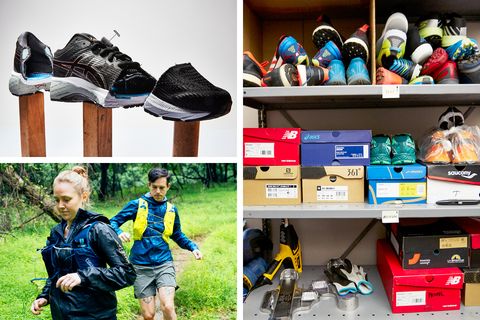
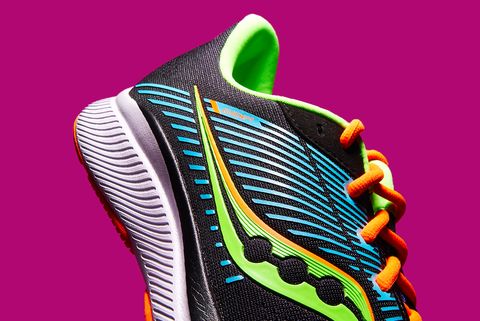
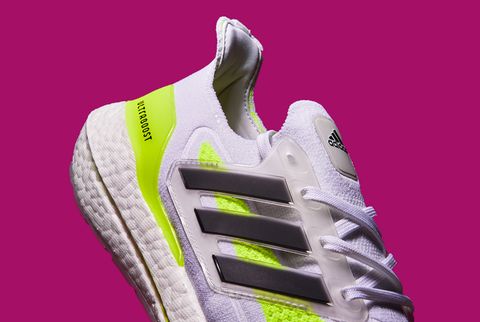
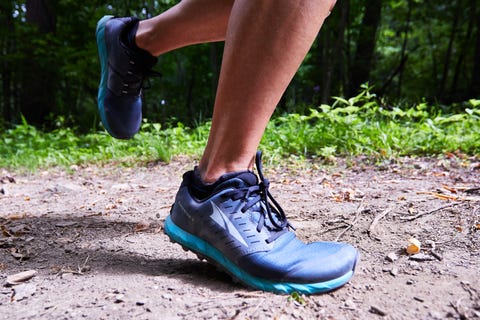
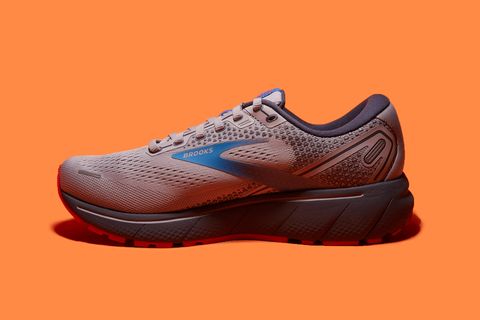




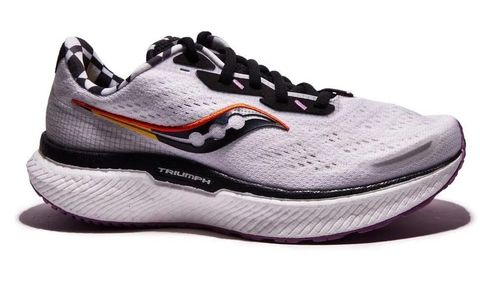
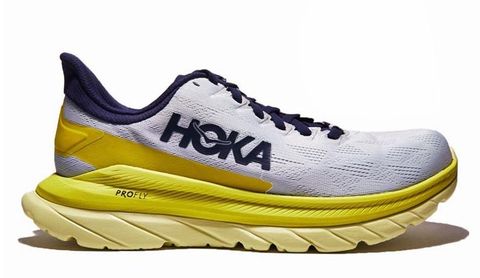
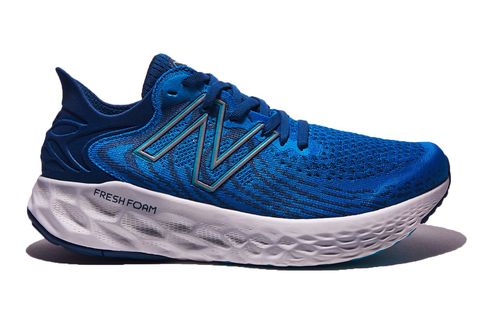

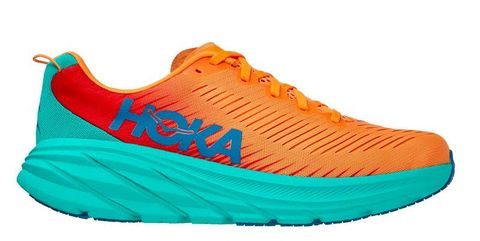






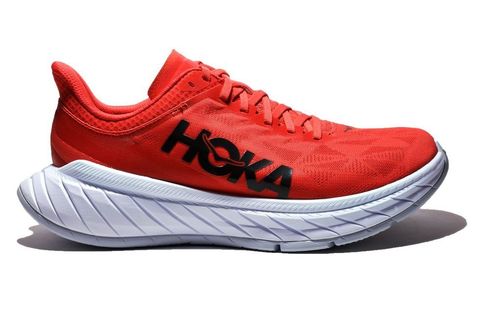

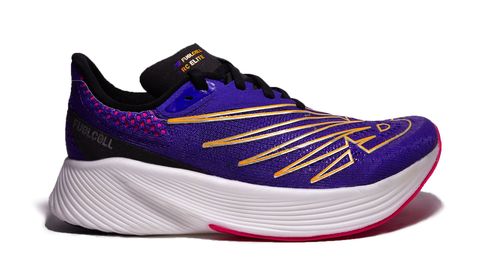








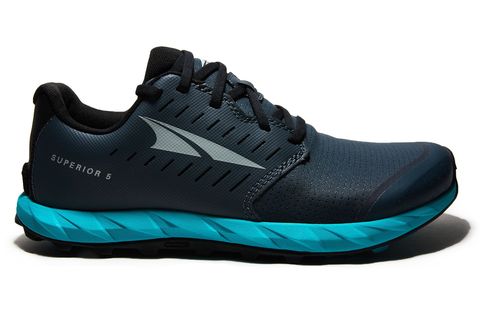





Comments (0)